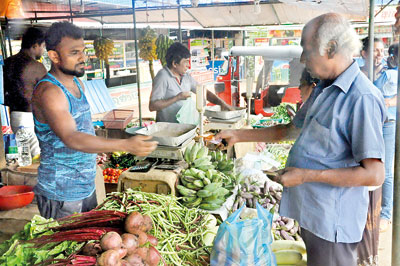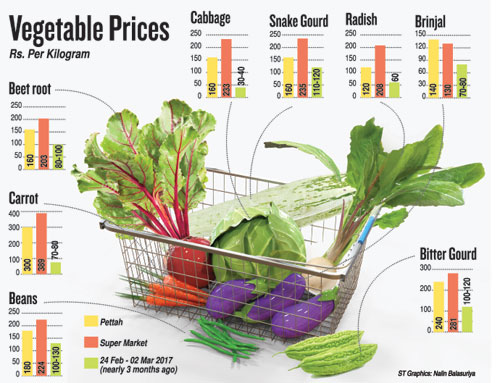News
Vegetable prices balloon in the wake of shrinking yields
View(s):Falling crop yields have triggered a drastic rise in vegetable prices in Colombo and in remote hamlets.
Prices of some vegetables have soared past Rs 200 a kilo. This in turn has prompted hoteliers and suppliers of packed lunches for working people to raise retail prices.

Rising veggie prices stand in contrast to few months ago when there was a glut of vegetables and farmers dumped them because they were getting low prices. Pix by Athula Devapriya
In a market in Delgoda, Kelaniya, a road side vendor offered 250 grams of beans at Rs 50, while 250g of beetroot was Rs 40. Okra was sold at Rs 50 for 250g and the same amount of tomato cost Rs 40. From the first week of this month to the second week, the price of green chilli has jumped from Rs 270 a kilo to Rs 310.43 a kilo in the main markets of Colombo.
Local potato sells for between Rs 140 and Rs 180 a kilo. Small scale vegetable sellers have been badly hit due to high prices. Santha Kumara, 55, from Katulanda, Delgoda complained that consumers are buying ever smaller quantities of vegetables.
The rising prices stand in contrast to few months ago when there was a glut of vegetables and farmers dumped them because they were getting low prices. B. Balachandra, the owner of an eatery in Nawala, said she was compelled to pay market prices. âWe canât increase the price of lunch packets as it would hurt sales,â she said.

B. Balachandra
But the quality of packed meals has worsened. Consumers are feeling the pain from higher prices compared with the past few months. N. Sivanadan, a businessman from Mattakkuliya, has noticed that prices are climbing every week. He adds that farmers can’t be blamed because they, too, have to bear huge financial losses at times.
Sujith Liyanage, a vegetable wholesaler for more than 30 years, who buys the produce directly from farmers, said the harvest has dropped everywhere in the country even in Embilipitiya and Norochcholai.
Meanwhile, Duminda Priyadarshana, head of marketing, food policy and the agri-business division at the Hector Kobbekaduwa Agrarian Research and Training Institute, said rising prices were not unusual, saying this was a seasonal spike.

Sujith Liyanage
Now that the Maha crop had been harvested, he said supplies will be low until the harvest from the Yala season. He predicts that by the mid July, prices will start to ease when the Yala crop reaches the markets.
Mr. Priyadarshana said the land preparions are done in May and June for planting. In addition, the southwest monsoon arrives in Sri Lanka at this time.
He believes the protracted drought did not have an adverse impact on crop yields.
The drought and the rainfall pattern in the past few months favoured vegetable growers, he said, adding that there was no link between rising prices and the drought.
Even the harvest in Nuwara Eliya and Kalpitiya, where vegetables are available throughout the year, declines in May and June, he said.


